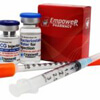In theory testosterone replacement should approximate the body’s own natural production of the hormone. The average male produces 4 to 7 mg of testosterone a day with plasma levels in early morning and lower levels in the evening. Women produce around a 12th of those rates.
Testosterone replacement is usually a life-long commitment. It is a decision that should not be made without a discussion with your health care provider. Starting and stopping testosterone can have negative effects on someone’s quality of life (more on this topic later).
There are testosterone replacement products that require daily dosing (orals, buccal, and gels), once a week or two weeks dosing (injections), and once every three- to four-month dosing (long-acting testosterone undecanoate injections) or testosterone pellets).
Males who are hypogonadal can be given continuous testosterone replacement therapy in a wide assortment of ways. These include:
1. Oral capsules
2. Testosterone injections
3. Transdermal (absorbed through the skin) testosterone cream or gel
4. Transdermal testosterone patch
5. Buccal (sublingual and gum adherent)
6. Pellets (that are implanted subcutaneously)
Recent Posts
UK Policy Statements on Testosterone Deficiency
Summary
To address widespread media and scientific concerns over the appropriate treatment of TDS with Testosterone Therapy (T Therapy), the Executive Committee of the British...
Beyond TSH: Two New Studies Show Why Doctors Should Check Other Thyroid Hormones
Beyond TSH: Two New Studies Show Why Doctors Should Check Other Thyroid Hormones
Many doctors only test thyroid stimulating hormone (TSH) to determine thyroid function....
What Every Man Should Know About HCG, Testosterone and Testicular Size.
What Every Man Should Know About HCG, Testosterone and Testicular Size.
Testosterone is one of the most important hormones for a man's health.
While most people...
Video: Testosterone in Women: Friend or Enemy ?
Allison Woodworth speaks about the facts and misconceptions of testosterone in women. Email her at [email protected] for more information on how to get your...
High Blood Pressure and Water Retention on Testosterone ( TRT )
Before you start testosterone replacement TRT, it is very important to get your blood pressure under control. This is done through diet, stress management, lowering your salt intake or the use of blood pressure medications. TRT can increase water retention and blood pressure during the first weeks of treatment.
















